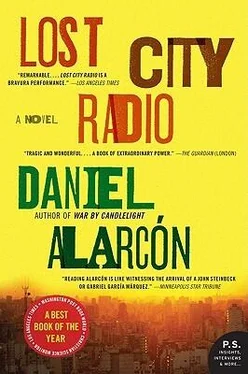He looked up. There were hours yet to this day. The children had formed another circle around their mothers, not quite understanding what the fuss was about, and this, too, made Zahir despair — how could they understand? Didn’t they want to leave as well? Weren’t they just biding their time?
Blas drew more than seventy pictures in the village over the next week. Business, he told the regulars at the canteen, had never been so good. Many drawings, quite surprisingly, were of people who were not yet missing. Women came with their husbands, mothers with their sons. “We’re afraid,” they said, tears in their eyes. “He’s here now, but what about tomorrow?”
“I’M LISTENING, madam,” the old artist said. Blas had worked on his voice for years. It was important in his line of work to put women immediately at ease: he very nearly purred. It had rained for two days, and so he had moved into the canteen, at the far end. He pulled the curtain, and they were alone in this makeshift private studio: two stools, an easel, an array of colored pencils. “Tell me.”
Adela said nothing for a long moment. Her feet tingled.
“Does the boy look like his father?”
She shook her head. “He looks like me.”
“How old is he?”
“Twelve months,” she said. “A year.”
The artist rubbed his face. He leaned toward her. “The father. How old is the father?”
“Oh,” Adela said. “I don’t know.”
Blas turned the canvas around. It was empty, not a mark on it. “Don’t be nervous, dear,” he said in a voice just above a whisper. “There’s nothing to be afraid of. Close your eyes and talk about him, and we’ll do this together.”
Adela took a deep breath. “He’s not from here. And that’s what you notice first. He comes from the city. His smile is like city people smile: halfway. He’s careful. His hair flops forward onto his forehead, but he’s always brushing it back with his palm. He has dimpled cheeks, and his eyes seem tired all the time. His hair is gray at the temples, with nearly white streaks, but he won’t admit it. I think he may dye his hair. He’s vain.”
“Should I draw it black then? Or white? Which is it?”
“Draw it true. It’s white.”
“Is he thin?” Blas asked.
Adela nodded.
“His skin tone, madam. Is he dark like coffee, or light like milk?” He still hadn’t begun to draw, not really; two very light strokes, vaguely parallel. His eyes were closed, and the point of the pencil just barely touched the paper.
“Like coffee,” Adela said, but her mind was wandering. “And he loves the boy, I know that, I can tell.” She paused. “But he doesn’t love me.”
“Madam!”
“A woman knows these things, sir. He has another life. He’s told me and I’ve known from the beginning. I know some other things, some things he hasn’t told me. I know that one day he’ll come and take my child from me. I swear he will. He’ll say it’s for the boy’s own good, and how can I argue with that? But then what will I do? I’ll be like these old women here, who can’t remember who used to love them or why they’re alive.” She took a shallow breath. “He’s cruel.”
“Madam, pardon me, what does he look like?”
“Oh, yes. His hair, for example. It’s beginning to fall out. Each time I see him he looks older. His nose is crooked, just a bit, to which side? Well, to the left. His beard doesn’t grow in evenly; isn’t that the strangest thing?”
“Strange yes, madam, but not the strangest.”
“You’ve seen all kinds of things.”
“Of course,” Blas said apologetically.
Adela rocked the sleeping child in her arms. “Every time he leaves,” she said, “I’m afraid he won’t come back.”
“Why are you scared?”
“His work is dangerous.”
The old artist didn’t look up and didn’t say anything. Dangerous work was the only kind that existed in those days. The country was at war. He selected another pencil, a lighter color, and his right hand moved feverishly around the paper. He rubbed the page with his thumb, blurring the markings. “Are his eyes far apart?”
“No.”
“Are they close together?”
“I’m not sure.”
“His hair is curly?”
She thought for a moment. “Wavy.”
“His forehead — it’s high like this? Or small, like this?”
Adela squinted at the drawing. “In between, I suppose. And more wrinkled. He’s getting older, did I tell you that?”
The child twisted in her arms, a tiny hand poking free, a small fist opening, closing, grasping at the air. In an instant, it was over, and the boy was completely asleep once again. Blas and Adela had both stopped to watch him.
“It’s a pity for your husband that he doesn’t look like this boy of yours. He’s a beautiful child.”
“Thank you,” Adela said. “He’s not my husband.”
“I’m sorry, madam. God is merciful.”
“Are we nearly finished here?”
“Yes, very nearly.”
Blas leaned over the page, touching up the drawing. He asked a few more questions: about the shape of the man’s jaw, the size and placement of his ears, the style in which he wore his hair, and how gray was it exactly, and how did she know it was grayer than he wished it to be.
“Don’t we all want to be young forever?” Adela said.
Rey flashed across her mind, images of him in various stages of undress. He was not a beautiful man and he was not even hers. But the child was. She looked at her boy, asleep: the drawing, she told herself, was for him. When Rey first came to her, he was surprised at how cool the nights were here when the days were so hot. He knew almost nothing about the forest. “What do they teach you at that school?” she’d asked, but it was what she’d loved most about him: he knew nothing, because he was a stranger. His foreignness, his accent, his gestures — they belonged to another place, and just being with him was enough for Adela to imagine another, less claustrophobic existence.
When Blas asked about the lips, Adela licked her own, as if she could still taste him. “They’re full,” she said. Blas drew, he erased, then he drew some more. When he was satisfied, Blas asked Adela to look very carefully. “Is this him?” he asked. He had a pitch, a tone of voice, prepared just for this question. He had posed it a thousand times since the war began, and the answer was always the same.
THE DECISION was made for them. By the time they thought to leave, there were no cabs to take them home. Not at that hour, not so close to curfew. The deserted city was a minefield. So they returned to the party, Norma and Rey, Elmer not far behind, and they found themselves once again in the great room, being served drinks by the bartender in a tuxedo. The man had taken his jacket off and was drinking himself now. Elmer spoke, but they couldn’t hear him, and they didn’t try. There was dancing all around them, and night had fallen heavily on the room. Where there was panic, there was freedom. What a giddy feeling! Rey took his wife by the hand, led her to the middle of the dance floor. He pressed his body against hers. She pressed back, and it was beautiful, and then they were moving, as they had once upon a time: there are things the body won’t allow you to forget. It had been too long since they’d danced. “Louder!” someone yelled, and the music rose even more. Her chin rested on his shoulder, and he could smell her. The chandelier shook. The darkness was nearly complete; Rey had to be careful not to lose her to the crowd.
THERE WERE rules, of course, even that first night. The program would run on a six-second delay. This took some of the pressure off of Norma. The calls would be screened and everyone warned not to mention the war. This was good advice, not just for the radio, but for life, because these days, someone was always listening. Neutrality was the word Elmer kept repeating. Not to be confused with indifference , Norma thought. People, she should keep in mind, went missing for all sorts of reasons, and the show was not to be a sounding board for conspiracy theories or gripes about this or that faction, or speculations about a certain prison whose very existence was a state secret, however poorly kept. The show, Elmer lectured Norma, was a risk, but a calculated one. There were hundreds of thousands of displaced people who would form the loyal core of her audience. Hope could be dispensed in small doses to the masses of refugees who now called the city home. They didn’t want to talk about the war, he guessed; they wanted to talk about their uncles, their cousins, their neighbors from that long-ago-abandoned village; the way the earth smelled back home, the sound of the rain as it fell in bursts over the treetops, the lurid colors of the countryside in bloom. “You, Norma, just be nice, the way you know how to be, and let them talk. But not too much. Get names and repeat names and the phone calls will come in by the dozens. Ask nice questions. Got it?”
Читать дальше












